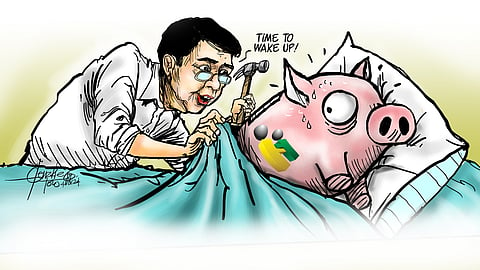
- NEWS
- the EDIT
- COMMENTARY
- BUSINESS
- LIFE
- SHOW
- ACTION
- GLOBAL GOALS
- SNAPS
- DYARYO TIRADA
- MORE

Budget watchdogs are confident that the Supreme Court (SC) will declare unconstitutional the Department of Finance (DoF) directive to sweep excess funds from the 2024 national budget since it has the same characteristics as the notorious Disbursement Acceleration Program (DAP).
DAP was created during the term of the late President Benigno Aquino III, meant to stimulate the economy through increased public spending. A money pool was created that is directly controlled by the President, raised from forced savings of different agencies. In a 2014 ruling, the Supreme Court disallowed as unconstitutional certain methods in building what was referred to as the presidential pork barrel, which are:
* The withdrawal of unobligated allotments from the implementing agencies and the declaration of the withdrawn unobligated allotments and unreleased appropriations as savings prior to the end of the fiscal year and without complying with the statutory definition of savings contained in the General Appropriations Act;
* Cross-border transfers of savings of the executive department to offices outside the executive department; and
* Funding of projects, activities and programs not covered by appropriations in the General Appropriations Act.
The court also declared the use of unprogrammed funds void without the National Treasurer’s certification that tax collections exceeded the revenue targets. The move to collect excess, or what Finance Secretary Ralph Recto termed as sleeping, funds was done through a circumvention of the DAP ruling.
A provision in the 2024 General Appropriations Act allowed the DoF to issue Circular 003-2024, authorizing PhilHealth and the Philippine Deposit Insurance Corp. to transfer P89.9 billion and P110 billion, respectively, to the National Treasury.
More than P200 billion in unprogrammed items that the DoF seeks to finance stemmed from the bicameral conference committee’s insertion of funding for pet projects of legislators in the 2024 budget, or to cut the chase short, to revive the pork barrel.
In the case of the DAP, it was the Department of Budget and Management that allocated projects to legislators, primarily during the impeachment proceedings of the late Chief Justice Renato Corona. In the new version, the excess funds collected by the DoF were intended to go to unprogrammed appropriations worth P203.1 billion in health, infrastructure, and social services.
Both the DAP and the DoF move were designed to replace the pork barrel system, which the Supreme Court deemed in violation of the Constitution in a 2013 decision. Only, the complicity of the DoF was meant to go around the requirement of the DAP ruling for a certification from the National Treasury, which was not exactly the terminology in the provision.
The requirement was for a certification that revenues exceeded targets and not the DoF, through the Treasury, allowing the use of idle funds. The provision in the 2024 GAA enabled the breach in the SC ruling on the DAP.
Senator JV Ejercito said that the Senate will hold a probe on the DoF Circular “to stop any other attempts to misappropriate funds intended for health services.” Ejercito is a main proponent of the Universal Health Care (UHC) Act, the implementation of which is severely affected by the siphoning of funds from PhilHealth, which implements the law.
By now, five years after its implementation, the benefits of the UHC should have been felt by Filipinos. Sadly, that is not the case, and the existence of the so-called excess funds in PhilHealth rubs salt in the wound, according to Ejercito.
The conspiracy in reviving the DAP through the DoF Circular is reprehensible, and its most likely fate is that it will be struck down by the SC. Finance Secretary Ralph Recto will then be saddled with the gargantuan responsibility of ensuring that all of the P60 billion already transferred is safely returned to PhilHealth.
